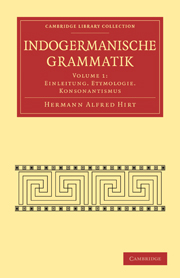Book contents
- Frontmatter
- Vorwort
- Contents
- Literaturangaben
- Verzeichnis der Abkürzungen
- Einleitung
- Erster Teil. Etymologie
- XI. Kapitel Die Lautlehre
- XII. Kapitel Grundgesetze der etymologischen Forschung
- XIII. Kapitel Die Bedeutung der Wörter
- XIV. Kapitel Verwandte und entlehnte Wörter
- XV. Kapitel Verlust von Worten
- XVI. Kapitel Etymologie und Kulturgeschichte
- Zweiter Teil. Der idg. Konsonantismus
- XVII. Kapitel Die Sonorlaute
- XVIII. Kapitel Die Zischlante
- XIX. Kapitel Idg. j und w
- XX. Kapitel Die idg. Tenues und Mediä
- XXI. Kapitel Die idg. Mediä aspiratä
- XXII. Kapitel Die Lautverschiebung
- XXIII. Kapitel Das Hauchdissimilationsgesetz im Griechischen und Indischen
- XXIV. Kapitel Die Gutturalreihen
- XXV. Kapitel Die Tenues aspiratä
- XXVI. Kapitel Sonstige Laute des Idg
- XXVII. Kapitel Konsonantenverbindungen
- XXVIII. Kapitel Die r-Verbindungen
- XXIX. Kapitel Die l-Verbindungen
- XXX. Kapitel Die n-Verbindungen
- XXXI. Kapitel Die m-Verbindungen
- XXXII. Kapitel Die w-Verbindungen
- XXXIII. Kapitel Die j-Verbindungen
- XXXIV. Kapitel Die s-Verbindungen
- XXXV. Kapitel Veränderungen des Konsonantenstandes im Idg. Schwund von Konsonanten
- XXXVI. Kapitel Konsonantenwechsel
- XXXVII. Kapitel Auslautsgesetze
- XXXVIII. Kapitel Der Anlaut
- Autorenverzeichnis
- Sachverzeichnis
- Wörterverzeichnis
XII. Kapitel - Grundgesetze der etymologischen Forschung
Published online by Cambridge University Press: 05 August 2011
- Frontmatter
- Vorwort
- Contents
- Literaturangaben
- Verzeichnis der Abkürzungen
- Einleitung
- Erster Teil. Etymologie
- XI. Kapitel Die Lautlehre
- XII. Kapitel Grundgesetze der etymologischen Forschung
- XIII. Kapitel Die Bedeutung der Wörter
- XIV. Kapitel Verwandte und entlehnte Wörter
- XV. Kapitel Verlust von Worten
- XVI. Kapitel Etymologie und Kulturgeschichte
- Zweiter Teil. Der idg. Konsonantismus
- XVII. Kapitel Die Sonorlaute
- XVIII. Kapitel Die Zischlante
- XIX. Kapitel Idg. j und w
- XX. Kapitel Die idg. Tenues und Mediä
- XXI. Kapitel Die idg. Mediä aspiratä
- XXII. Kapitel Die Lautverschiebung
- XXIII. Kapitel Das Hauchdissimilationsgesetz im Griechischen und Indischen
- XXIV. Kapitel Die Gutturalreihen
- XXV. Kapitel Die Tenues aspiratä
- XXVI. Kapitel Sonstige Laute des Idg
- XXVII. Kapitel Konsonantenverbindungen
- XXVIII. Kapitel Die r-Verbindungen
- XXIX. Kapitel Die l-Verbindungen
- XXX. Kapitel Die n-Verbindungen
- XXXI. Kapitel Die m-Verbindungen
- XXXII. Kapitel Die w-Verbindungen
- XXXIII. Kapitel Die j-Verbindungen
- XXXIV. Kapitel Die s-Verbindungen
- XXXV. Kapitel Veränderungen des Konsonantenstandes im Idg. Schwund von Konsonanten
- XXXVI. Kapitel Konsonantenwechsel
- XXXVII. Kapitel Auslautsgesetze
- XXXVIII. Kapitel Der Anlaut
- Autorenverzeichnis
- Sachverzeichnis
- Wörterverzeichnis
Summary
Lautlehre und Etymologie. Lautlehre und Etymologie gehören zweifellos auf das engste zusammen. Man kann die Lautlehre nur dann von der Etymologie loslösen, wenn es sich um die Feststellung des Lautstandes einer Sprache handelt. Daher hat denn auch am Anfang eine ganz enge Verbindung zwischen den beiden Gebieten bestanden, die erst später etwas gelockert ist. Man muß sie aber immer wieder herstellen. Man kann nicht in der Lautlehre forschen, ohne sich über die Grundgesetze der Etymologie klar geworden zu sein. Die bis ins kleinste, scheinbar bis ins Kleinliche geführten Untersuchungen über die Lautlehre haben ihre besondere Bedeutung für die Etymologie und damit auch wieder für die Geschichte. Denn erst die Lautgesetze ermöglichen es uns, zwischen ererbten und entlehnten Worten zu unterscheiden, und zuweilen auch die zu erkennen, die in demselben sprachgebiet gewandert sind.
Anm. Allgemeine Erörterungen über Etymologie finden sich bei: G. Curtius, Grundzüge der gr. Etymologie 1879.
Delbrück, Die idg. Verwandtschaftsnamen 1889.
Thurneysen, Die Etymologie.
Hirt, Etymologie der neuhochdeutschen Sprache 1921.
Form und Bedeutung der Worte. Wenn man die Anfänge der etymologischen Forschung betrachtet, so findet man, daß sich die Forscher zunächst von einem gewissen äußern Gleichklang und von der Gleichheit und Ähnlichkeit der Bedeutung leiten lassen. Ist die Gleichheit der Bedeutung vorhanden, so nimmt man auch eine etwas abweichende Form in Kauf. So hat man anfangs gr. ϑεός mit ai. dēvás und l. deus zusammengestellt.
- Type
- Chapter
- Information
- Indogermanische Grammatik , pp. 144 - 157Publisher: Cambridge University PressPrint publication year: 2009First published in: 1927



